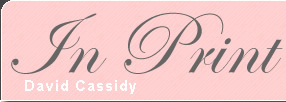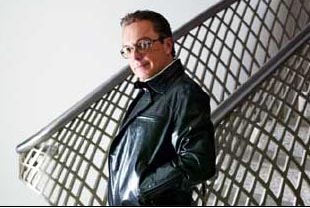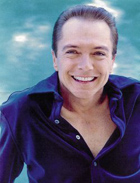
David Cassidy on the Web
Still a daydreamer
Saturday March 24, 2007
By Jackie McGlone
The Scotsman

David Cassidy was the first-ever teenage pop idol to be globally marketed and merchandised. He was, he jokes, "the first one-man brand". Picture: Graham Jepson
THE AIR IS THICK with the cloying scent of hormones and perfume in the London bookshop where hundreds of swooning women of a certain vintage wait to spend less than a minute in the hallowed presence of their idol.
The girlish ghosts of the carefree teenagers they once were return as, faces wreathed in blushing smiles, the women emerge clutching signed copies of their heartthrob's life story as if they were the Dead Sea scrolls.
"What did he say?" Lin from Liverpool asks her pal Julie. "I can't remember, but it was lovely," replies the hyperventilating blonde, who has dressed up to the tens for her brief encounter with a slightly built, bespectacled, balding 56-year-old. "So what's he written in our books?" demands Lin, who was charged with capturing the event for posterity on digital camera and two mobile phones.
"To Lin, Much love, David Cassidy," she reads out, looking as if she is about to succumb to an attack of the vapours. Like hundreds of other devoted fans of the doe-eyed, squeaky-clean singer, who was once the stuff of their yearning teenage dreams, Lin and Julie have been queuing for hours at the Oxford Street branch of Waterstone's.
"We got here around seven o'clock. There were at least 50 people ahead of us; the first arrived at 2am," says Julie, still glowing like the 13-year-old she was when she fell in love with the cute star of The Partridge Family - the chirpy 1970s sitcom about a single mother who with her children forms a band - when he was so androgynously pretty that he was universally regarded as the most beautiful man in the world, "bigger than Elvis, bigger than the Beatles".
Lin was nine when she succumbed to the elfin charms of the twinkly-eyed, long-lashed, feather-cut Cassidy. "We're not in love with him any more," confides Julie. "But still he makes us happy." "He reminds us of innocent times," says Lin as Cassidy's dulcet tones crooning one of his greatest hits, Could It Be Forever?, resound on the store's stereo system. Suddenly, it's all over. The diminutive David departs, after signing and personally dedicating, he later estimates, more than 300 books.
"He's an a***hole!" spits a lone man, whose books Cassidy refused to sign, because the guy didn't want them personalised. Cassidy told him he knew they would end up on eBay and therefore he would be ripped off, words said with feeling because few performers have been so roundly shafted by the entertainment industry as we shall discover later. "What a b******!" the man yells, as hordes of tearful women chant: "We love you, David! David! David! We love you, love you, love you!" Although David has left the building.
An hour later, Cassidy is slumped on a baroque sofa the size of a double bed in the lobby of the Dorchester in Mayfair, where he's staying on a flying visit from his waterfront mansion in Fort Lauderdale, Florida. He resembles a broken puppet whose strings have been severed.
"Man, I'm exhausted! My right hand and arm are paralysed," he groans, painfully gesturing tiny digits like seizured claws. "And I'm jet-lagged," he sighs, sinking wearily into an alpine range of silken cushions and bolsters. "You have no idea how much these events take out of me. It's because I give so much," he says, when I tell him about Julie and Lin. "Exactly!" he exclaims, rallying from his stupor.
"You've got it - I symbolise happiness for so many people. It's phenomenal!"
Requesting a pot of "very hot" English breakfast tea, he peers myopically at the menu, which for some reason known only to the Dorchester is printed in an almost illegible pale-grey typeface. Cassidy moans softly and removes his shades, revealing his famous faun-like gaze, but the effort is clearly too much for him. Overcome by torpor yet again, he announces that the problem is, he's left his reading glasses upstairs in his suite. He lies back, closing his eyes. So I recite the menu to him. We order our food and he declares: "OK, let's rock. Ask me anything you want. I'll answer."
Well, of course, being of an inquisitive nature, I am tempted to ask if the rumours are true, that for one so small and so perfectly formed - how can I put this in a family newspaper? - he is prodigiously well-endowed.
I don't ask, though, since he's answered this and so many other much more intriguing questions in his exhaustive, and sometimes exhausting autobiography, Could It Be Forever? Exhausting because the story this 358-page tome tells is often harrowing, as Cassidy details the terrible emotional, physical and financial toll of the treacherous Faustian pact that is global fame. It should be required reading for all participants in Pop Idol or Fame Academy since it presents some dire warnings about the perils and pitfalls of celebrity.
(The answer to the question I did not ask? His three step-brothers' nickname for him is "Donk", so readers can draw their own conclusions, especially as Cassidy writes that he's been described as being "blessed" in that area, after several of his many "conquests" sold their stories.)
Blessed he certainly appeared to be in the 1970s when, as the first-ever teenage pop idol to be globally marketed and merchandised, he was, he jokes, "the first one-man brand". He was the least obscure object of desire for a generation of teenage girls, the most perfect boy on the planet, despite a fondness for puka-shell necklaces, lavishly embroidered dungarees and skin-tight, rhinestone-encrusted white jumpsuits, in which he would wave his pert bottom at love-crazed adolescent girls.
Pursued by hysterical young women desperate to have sex with him, he had hundreds of sexual encounters, a fact that he takes no pride in today, telling me that he did things that were often degrading for the women involved - "and for that I'm ashamed, but back then sex was just sex".
He asks: "Did I do anything any red-blooded man in his twenties wouldn't have if given the opportunity? The most beautiful women in the world were calling me, saying, 'I've got to see you. Please let me see you.'
"And they would come up to my room. They were banging on the door begging to be let in." He liked their blatant honesty, he says, adding that often he wouldn't bother with the sex.
"I was so lonely, I was desperate to talk to real people. I would ask them to tell me about their lives. I loved to hear about how ordinary people just got on with day-to-day living, because I couldn't. I was drinking heavily, partying hard and trying every drug available. It's a miracle that I avoided addiction."
The sex, he says, was a compensation for not being able to lead a normal life. "At least I could be the real David Cassidy in my bedroom. There, the real David Cassidy could live, and live well," he writes.
He was, he insists, as he energetically attacks his smoked chicken and mozzarella baguette, "always into older women, not underage girls". When he was 20, he liked 25-year-olds and by the time he was 25, he preferred thirtysomethings.
"I even married an older woman," he says, with a puckish grin.
His third wife and the mother of their 16-year-old son, Beau, is the singer-songwriter Sue Shifrin, who is a couple of years older than him. "She's a real beauty, both inside and out," he says.
While Could It Be Forever? chronicles Cassidy's psychedelic sexual adventures among many, many other misadventures, it is not a kiss-and-tell book. "I was determined that my book would not be tacky," he insists. "I do not name names and I never will. I may not have always behaved like a gentleman in the past, but now at least I can. I hate those trashy books that go into sordid details - it's such a betrayal of trust."
Instead, he tells a sad but finally redemptive story of loneliness, confusion and emptiness; of how, after notching up seven UK Top 20 hits in four years, becoming the highest-paid solo performer in the world (on paper) by the age of 21 and selling more than 35 million records, he walked away from it all in 1974. Had he stayed shackled to the ball and chain of fame and pre-packaged pop idol stardom, he would not be alive today, he believes.
DAVID CASSIDY was born in New York, the son of Jack Cassidy and Evelyn Ward, both actors, both "narcissists". When he was three years old his father walked out, marrying Shirley Jones, the star of Carousel and Oklahoma!, with whom he went on to have three sons - Shaun, Patrick and Ryan. The boy David never got over his sense of loss and pain.
From working-class Irish roots, he did not grow up as showbiz royalty, as many people assume. This, despite the fact that his "grandiose, emotionally unbalanced, wildly self-indulgent" father was an immensely talented actor, starring on Broadway and appearing in many movies. According to Cassidy, his father was also a manic depressive, "a vain philanderer, an alcoholic - and a bisexual", a fact he discovered only after Jack died in 1976. "I worshipped my father - he was so seductive," he says.
Determined to earn his father's respect, Cassidy turned to acting on graduating from high school and within a year was becoming successful. "I was a working actor, just like my dad, although I never ever won his approval. After guest starring in popular TV shows such as Ironside and Bonanza, I was hot. I screen-tested for a big Hollywood movie in California, but they thought I looked too young."
However, the producers of a new half-hour sitcom, The Partridge Family, ironically starring Cassidy's step-mother Shirley Jones as the mom, saw the test and cast the 20-year-old as her 16-year-old son Keith. "I was this hippie, a wild child hanging out up Laurel Canyon, smoking dope, playing my guitar, and dreaming of becoming the new Jimi Hendrix. The Partridge Family producers didn't even ask if I could sing; I was cast only to act. After they discovered I really could sing it was crazy - the hits, such as I Think I Love You and Cherish, just kept on exploding."
Cassidy was so naÔve - he assumed the saccharine show, with its bland, bubblegum music, would flop - that he signed away the rights to his own image. His face made everyone but him a fortune, selling around 500 million (£250m)-worth of lunch-boxes, pillowcases, bubblegum cards, even dresses. He had the biggest fan club any artist, including the Beatles, had ever had. But he didn't own the rights to his own likeness or his records, so he made only 15,000 (£7,500), thanks to the duplicity of various business associates.
In America, Australia and the UK he broke box-office records, but when a 14-year-old British fan was killed in the crush at his White City Stadium concert in 1974 he was so devastated that he decided to quit. A few nights later he gave his final concert in Manchester.
A year earlier, he had met his idol, Elvis Presley. "The fear had already set in for him. I recognised the sadness in his face and eyes. I remember thinking, 'That's me in ten years' time,' because I saw that he'd sold his soul to the devil. I didn't; I was able to stop at the top."
In the throes of a nervous breakdown, Cassidy became a recluse. "I was 25, the most famous guy in the world and I was this lost boy. I'd been robbed of my identity - and everything else." He didn't leave his bedroom for 18 months, although his friend John Lennon had become his mentor, because he too was in the process of "demystifying himself".
Lennon gave him good advice on how to start living a normal life again. However, two broken marriages and years of therapy followed.
"But not scream therapy like Lennon," he writes in his book. After 15 years on psychiatrists' couches, Cassidy realised one day that he felt happy. "I felt healed. All that stuff about my father leaving us, his envy of my success, didn't hurt any more. I've now made peace with my dad. Also I was bored with talking about myself - I'm still tired of the sound of my own voice going on about me, me, me."
By the mid-1980s he was broke and in debt. He reinvented himself on Broadway, created the mega-hit show, The Rat Pack Is Back!, starred in Blood Brothers and performed in Las Vegas. He also continued making records. He's a horse breeder, happiest when trekking around stud farms in Ireland and Scotland. His fans here have stayed loyal, he says, and he has only happy memories of jetting into Glasgow on his own plane in the 1970s for a concert at Shawfield Stadium. "There were thousands of girls at the airport, lining the route for miles and miles. They really let you know they love you, Scots!"
His family life could not be happier. He claims his father's behaviour taught him how to be a good, loving parent. "I've done all the things with my son that my dad never did with me," he says.
He has a 20-year-old actress daughter, Katie, from a previous relationship. Her mother, the actress-model Shirley Benedon, refused to let Cassidy see Katie for the first 12 years of her life, although he's always supported her financially. "It broke my heart that I wasn't able to see her," he murmurs.
When she was 15, Katie was encouraged by others to pursue a pop career, recording one of her father's most famous hits, How Can I Be Sure? It created a rift between them. "I couldn't support her wanting to become the next Britney Spears, a pop diva, when she was only 15 - I wouldn't support that for any young person, let alone my own child. It didn't happen for her, thankfully. And she's glad now. We're very close. She's a brilliant young actress and is making it on her own. At the moment she's making a film with Liam Neeson. She adores Beau, who is musically gifted, and he worships her."
He's a contented man, he insists, although he worries about his octogenarian mother, who is very sick, suffering from dementia. "It's a horrible disease, tragic to see," he says. "I support her, take care of her and see her as often as I can. Immediately I fly home, I'll go to see her in the care home she's in on the West Coast. My heart breaks daily for her - she's been very, very important to my life. Now, I'm the only person she recognises. I wanted her to come and live with us, but she's far too frail."
There's something incredibly boyish about Cassidy, despite his age. Perhaps this Peter Pan syndrome is down to the fact that he spent his early years pretending to be younger than he was? "Certainly, I was robbed of my early life," he says. Perhaps he looks so smooth and tanned because he's had a nip and a tuck? "No, I have not," he replies.
"I haven't had Botox, or anything. I do have lines. Have a look, get up as close as you like." He offers me his neat features for inspection. "When I was 29, I had the fat sucked out beneath my eyes, just here," he says, removing his shades so that I can see that he has some "real wrinkles" beneath his green eyes.
He does dye his hair, though. Which won't matter one jot to all those Julies and Lins out there. Even his fans' hair is chemically assisted nowadays. After all, nothing in this life is for ever. sm
Could It Be Forever? My Story, by David Cassidy, is published by Headline, priced £18.99.
